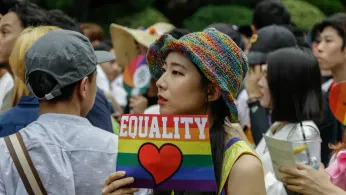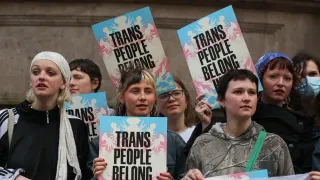
Oct 31
South Korea to Recognize Same-Sex Couples in National Census
READ TIME: 3 MIN.
South Korea is set to make history by counting same-sex couples in its upcoming national census, a move heralded by LGBTQ+ advocates as both symbolic and practical in the ongoing fight for equality and visibility. This policy change comes amid gradually shifting public attitudes, increased LGBTQ+ representation in popular culture, and legal victories that have drawn international attention to the evolving landscape of LGBTQ+ rights in East Asia .
Until now, South Korea’s census methodology only permitted the enumeration of opposite-sex married couples, effectively rendering same-sex couples invisible in official statistics. The 2025 census will, for the first time, allow same-sex partners to identify their household status, offering a more accurate reflection of Korean society .
This shift aligns with a growing recognition of LGBTQ+ relationships by the South Korean judiciary. In a landmark 2024 decision, the nation’s top court ruled that same-sex spouses are eligible for state health insurance benefits, establishing a legal precedent that state systems must recognize same-sex partnerships in certain contexts . While legislative change has lagged behind, the judiciary’s willingness to interpret existing laws with inclusivity signals incremental progress.
The current administration has sent mixed signals regarding LGBTQ+ rights. President Lee Jae Myung’s nominee for gender equality minister has publicly committed to pursuing an LGBTQ-inclusive nondiscrimination law. However, the president himself has prioritized economic policy over social reforms, indicating that substantive legislative changes may not be immediate .
South Korean society remains divided on LGBTQ+ issues. While visibility has increased, with more LGBTQ+ individuals and allies speaking out in the media and arts, social acceptance is not universal. A 2025 Ipsos poll found that 51% of South Koreans oppose public displays of affection, such as kissing or holding hands, between LGBTQ+ people—demonstrating that while state recognition may be progressing, social attitudes are slower to shift .
Nevertheless, the prominence of openly LGBTQ+ celebrities, including several K-pop idols, has contributed to a broader conversation about sexual orientation and gender identity. Advocacy groups have pointed to these figures as role models for youth and as evidence of a changing tide, even as conservative groups continue to resist broader acceptance .
South Korea’s move comes amid a broader East Asian context where LGBTQ+ rights have been the subject of ongoing debate. Taiwan remains the only jurisdiction in Asia to legalize same-sex marriage outright, while Japan’s courts and municipal governments have made incremental moves toward recognition without nationwide legalization .
By including same-sex couples in its census, South Korea is not yet affording full legal parity, but it is creating a foundation for future policy. Advocacy organizations have noted that reliable data is essential for crafting informed policies and for demonstrating the presence and needs of LGBTQ+ citizens .
Despite these positive developments, South Korean LGBTQ+ people continue to face significant legal and social barriers. Same-sex marriage has not been legalized, and anti-discrimination protections remain limited. Many LGBTQ+ individuals experience familial rejection, workplace discrimination, and harassment—issues highlighted by both local and international human rights organizations .
Religious and conservative groups have vocally opposed reforms, arguing that recognition of same-sex relationships threatens traditional values. Meanwhile, LGBTQ+ advocacy organizations have called for education, legal reform, and public awareness campaigns to counter misinformation and prejudice.
For many LGBTQ+ South Koreans, the census change is both personal and political. The acknowledgment of their families by the state represents a form of dignity and validation after decades of erasure. Community leaders have emphasized that visibility in official statistics can help combat stigma, secure resources, and foster a sense of belonging.
“Being counted means being seen. It’s an important step toward equality, even if we still have a long way to go,” said a spokesperson for Chingusai, a leading Korean LGBTQ+ rights group .
The decision to count same-sex couples in the national census is a significant milestone for LGBTQ+ people in South Korea. It reflects gradual legal, cultural, and political changes, even as full equality remains elusive. As the country prepares for its next census, advocates hope that this visibility will pave the way for comprehensive legal reforms and a more inclusive society.






